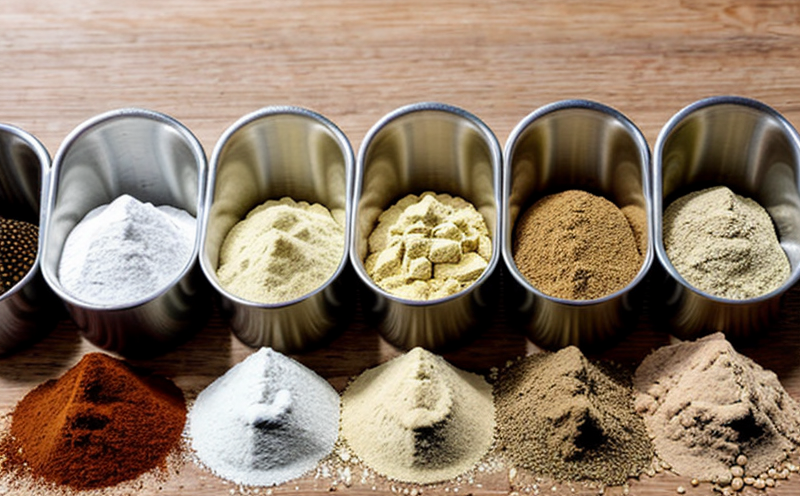EN 21427 Cobalt Detection in Ruminant Premixes
EN 21427:2018 is a European standard that specifies the procedure for determining cobalt content in ruminant premixes. Cobalt is an essential trace element required by ruminants, including cattle and sheep. However, excess or inadequate levels of cobalt can lead to severe health issues in livestock, affecting their productivity and welfare.
The standard plays a crucial role in ensuring that feed additives are correctly formulated, thereby supporting the overall health and performance of animals within the ruminant species. The detection method outlined in EN 21427 is designed to provide accurate and reliable results, which is essential for compliance with regulatory requirements and industry best practices.
The testing process involves several steps, including sample preparation, digestion, and analysis using an appropriate analytical technique such as Inductively Coupled Plasma Mass Spectrometry (ICP-MS) or Flame Atomic Absorption Spectrophotometry (FAAS). These methods ensure that the cobalt content is accurately measured in the ruminant premixes.
The importance of this testing cannot be overstated, especially given the potential risks associated with improper cobalt levels. By adhering to EN 21427, laboratories and feed manufacturers can prevent health issues such as cobalt toxicity (hypertrophic cardiomyopathy) or deficiency symptoms like poor reproductive performance and reduced milk yield.
The standard also provides guidance on how to interpret the results of the test, ensuring that feed additive formulations are optimized for the specific needs of ruminant species. This optimization is critical in a competitive market where animal health and productivity are key factors.
For quality managers, compliance officers, R&D engineers, and procurement professionals working in the food & feed sector, understanding EN 21427 is essential to ensure that their products meet regulatory standards and industry best practices. By ensuring accurate cobalt content, they contribute to safer and more effective ruminant premixes.
The test results from EN 21427 are used in various ways within the food & feed sector. Quality managers use these results to verify that their products meet the specified standards. Compliance officers rely on them to ensure regulatory compliance, while R&D engineers utilize the data for optimizing formulations. Procurement professionals can leverage this information to select suppliers who adhere to the highest quality and safety standards.
Why It Matters
The accurate detection of cobalt in ruminant premixes is vital for ensuring animal health, productivity, and welfare. Cobalt deficiency can lead to significant health issues such as anemia, poor reproductive performance, and reduced milk yield. Conversely, excess cobalt levels can cause hypertrophic cardiomyopathy, a heart condition that can be fatal.
Ensuring the correct cobalt content in ruminant premixes is also crucial for regulatory compliance. Regulatory bodies like the European Food Safety Authority (EFSA) have set maximum and minimum levels of cobalt to ensure that feed additives are safe and effective. Failure to comply with these standards can result in product recalls, fines, and reputational damage.
The importance of accurate cobalt detection extends beyond regulatory compliance. It also contributes to sustainable farming practices by optimizing the use of feed additives. This optimization ensures that resources are used efficiently, reducing costs for farmers while maintaining high levels of animal health and productivity.
Moreover, reliable cobalt testing helps in improving herd management practices. By ensuring that ruminant premixes meet the required cobalt content, farmers can achieve optimal animal performance, leading to better meat quality and quantity. This not only benefits the livestock industry but also contributes to food security by producing more nutritious and high-quality food.
In conclusion, accurate cobalt detection in ruminant premixes is essential for maintaining animal health, ensuring regulatory compliance, optimizing feed formulations, and promoting sustainable farming practices. It plays a pivotal role in achieving these goals, thereby contributing to the overall success of the food & feed sector.
Scope and Methodology
| Scope | Description |
|---|---|
| Detection of Cobalt Content | The standard specifies the procedure for determining cobalt content in ruminant premixes. |
| Sample Preparation | Includes digestion of samples using appropriate methods to release cobalt from the matrix. |
| Analytical Techniques | Use of ICP-MS or FAAS for accurate measurement of cobalt content. |
| Acceptance Criteria | Specified limits for cobalt content to ensure compliance with regulatory standards. |
| Methodology Steps | Description |
|---|---|
| Sample Collection | Collection of ruminant premix samples in accordance with EN 21427. |
| Digestion | Use of acid digestion to break down the sample matrix and release cobalt for analysis. |
| Analytical Procedure | Application of ICP-MS or FAAS to measure the cobalt content in the digested sample. |
| Data Interpretation | Interpretation of analytical results according to EN 21427 guidelines. |
Eurolab Advantages
EuroLab offers comprehensive and reliable services for cobalt detection in ruminant premixes, adhering strictly to the requirements of EN 21427. Our team of experts ensures that every test is conducted with precision and accuracy, delivering results that meet or exceed industry standards.
Our state-of-the-art laboratory facilities are equipped with advanced analytical instruments such as ICP-MS and FAAS, which provide accurate and precise measurements of cobalt content in ruminant premixes. This ensures that we can detect even trace amounts of cobalt, making our results highly reliable.
We employ highly skilled technicians who are trained to follow the procedures outlined in EN 21427 meticulously. This guarantees consistent and accurate results every time, ensuring compliance with regulatory standards and industry best practices.
EuroLab also provides detailed reports that include all relevant data from the testing process, along with interpretation of results according to EN 21427 guidelines. These reports are invaluable for quality managers, compliance officers, R&D engineers, and procurement professionals who need to ensure that their products meet the required standards.
Our commitment to excellence and our focus on precision and accuracy make EuroLab the preferred choice for cobalt detection in ruminant premixes. We provide reliable results that are essential for maintaining animal health, ensuring regulatory compliance, optimizing feed formulations, and promoting sustainable farming practices.





